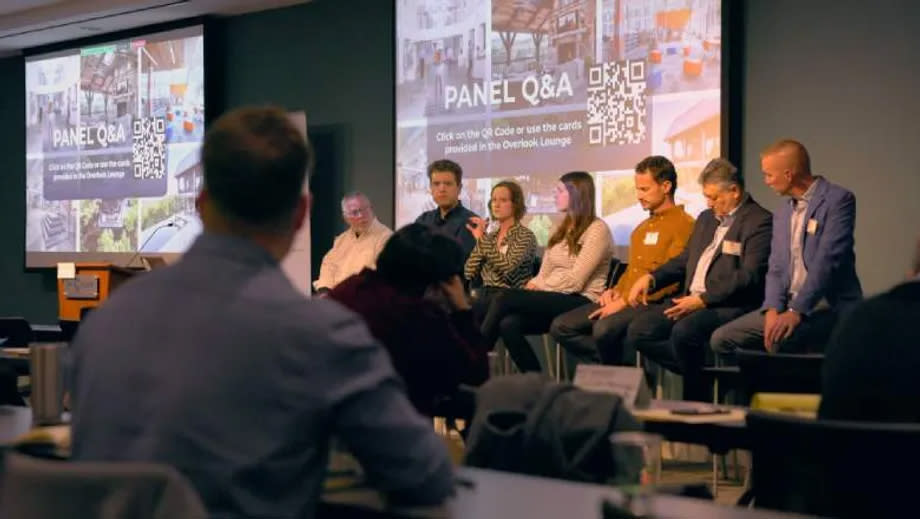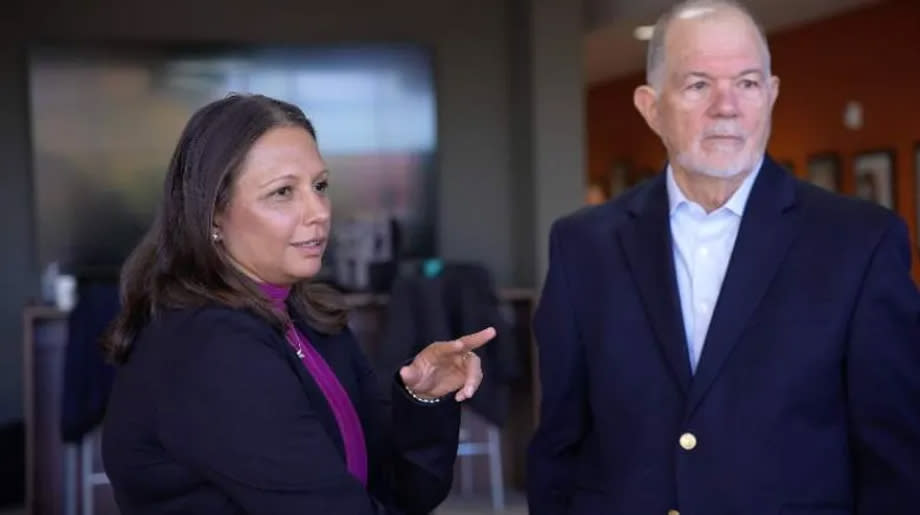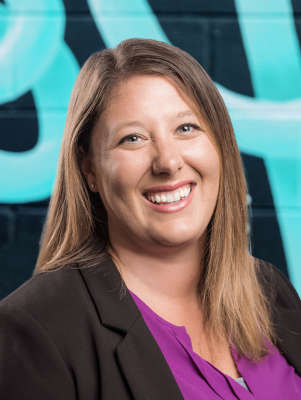
Meeting Case Study: Climate Adaptive Design Symposium
In the heart of downtown Asheville, a group of climate scientists, architects and members of the community gathered recently to explore the latest developments around building design's role in climate change. The 9th Annual Climate Adaptive Design Symposium provided compelling insights around this topic, taking place in a city that has long been a leader in climate research and data gathering. It offers a model for how planners can create an event that draws on Asheville's unique resources and strength around climate science and research.

The 9th Annual Climate Adaptive Design Symposium brought together experts in climate science and architecture, many based right in Asheville.
The two-day event took place at The Collider — a co-work and event venue specializing in climate-science initiatives, set in downtown Asheville. CASE and The Collider work with and host numerous private businesses and non-profits seeking space to forward their own missions, which range from protecting natural resources of our surrounding area to promoting more sustainable practices to forwarding climate-related initiatives with clients, including NCEI. "As Asheville's climate innovation center, The Collider underscores our city's commitment to fostering collaboration and innovation in addressing climate- and sustainability-related issues," she said. "We serve as a focal point for discussions, workshops, and events that bring together experts, researchers, and stakeholders to advance climate science and solutions."
The event was packed with presentations covering a range of aspects related to climate science and architecture. This included a "State of the Climate" report from Laura Stevens of the North Carolina Institute for Climate Studies (NCICS). This organization, which is headquartered in Asheville, is part of North Carolina State University, and partners with the National Centers for Environmental Information (also based in Asheville) to serve as a conduit between climate scientists, the government and the general public.

The Collider, a co-work and event venue specializing in climate-science initiatives, set in downtown Asheville, proved an ideal venue for the symposium.
In her presentation, Stevens drew on the National Climate Assessment, one of NCICS's numerous publications, to examine the latest findings on risks associated with climate change and the built environment. She also discussed Asheville's position as "Climate City," and the national and global relevance of the findings that came out of this destination.
Another Asheville-based speaker was Dr. Montana Eck, director of physical climate risk and resiliency at Mastercard, who provided an overview of Mastercard's approach to climate risk and credit considerations in the built environment (the human-made conditions developed by architects and affiliated fields).

The symposium offered numerous opportunities for the exchange of ideas around climate science and building design.
Bill Reed of Regenesis Principle, provided arguments for the value of "regenerative design" and the potential for exponential value to be gained from a more holistic approach to building.
"Bill guided attendees some case studies, principles, and process frameworks that are the basis for the practice of Regenerative Development and Design," said Crane-Lindsey. "These have been proven to invite significant transformation by aligning and healing/'wholing' human-to-human and human-to-nature relationships."
Crane-Lindsey says that overall, the event proved a success, drawing in more than 150 attendees both days, with a mix of both experts and those curious to learn more about a topic affecting virtually every industry.
"Climate City"
A major reason for the event's success is where it is situated. Asheville is an appealing destination for events of all kinds, thanks to its easy-to-reach location thanks to the Asheville Regional Airport, stunning natural surroundings and more than 9,200 hotel rooms across wide range of top-notch properties and meeting venues. Whether groups are looking to host a large-scale conference or a small gathering of decision makers, the city can provide unique facilities that will elevate the event.
But Asheville's offerings for climate science gatherings specifically is even more impressive. Environmental research has been an important focus for this city going back decades. "The city's strong emphasis on sustainability, both in its urban planning and community practices, is reflected in various local programs and events, creating an atmosphere where climate science discussions are welcomed and appreciated," said Crane-Lindsey.
She pointed out that this wealth of resources makes Asheville an ideal place for gatherings in any industry which is touched by climate science — which includes just about every industry. Whether looking for the latest data on climate patterns, or seeking to tap an expert speaker, or just sourcing a venue like The Collider that will foster the exchange of insights, this city offers a deep well of options for meeting planners.

Leaders of the North Carolina Institute for Climate Studies, Jenny Dissen (left) and Otis Brown (right).
Crane-Lindsey added that beyond these direct offerings, Asheville's "blend of a thriving arts scene, eclectic culture, and a commitment to environmental stewardship" helps create an atmosphere that is conducive to impactful discussions and events. "It's very easy for event planners to find the full range of event space, accommodation, food, and entertainment here – all within a compact and easy to access distance," says Crane-Lindsey. "Asheville's expanding airport also means more access and lower cost for planners looking to host their event in a place with distinct character."
Planning Support
The team at Explore Asheville is deeply connected to the community's industry leaders and a planner's best point of contact to host a meeting in this dynamic city. Connect with Explore Asheville's destination experts to tap into its complimentary meeting planning services and create a meaningful agenda.
EXPLORE ASHEVILLE SERVICES FOR CLIMATE SCIENCE MEETINGS
Kathryn Dewey with Explore Asheville will assist your organization in securing the right-size hotel and make the connections you need to local climate science expertise.
Contact Kathryn early in your planning stages for time-saving assistance and access to Explore Asheville's Exclusive Services. Plus, your meeting could qualify for our incentive program.
Cookies are used for measurement, ads and optimization. By continuing to use our site you agree to our Cookies are used for measurement, ads and optimization. By continuing to use our site you agree to our privacy policy.

For Visitors
For Media
For Planners




